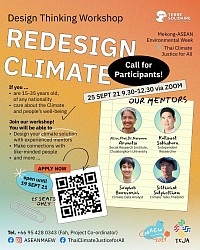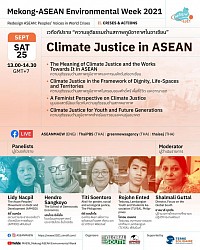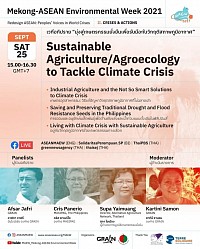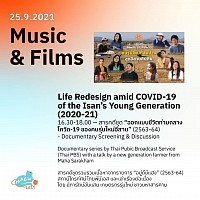25 September 2021
Training workshop “Redesign Climate” by the young ASEAN citizen
25 September, 9.30 am-12.30 am (Bangkok time)
Organizers: Climate Justice for all, Climate activists network
Mentors
- Assoc. Prof. Dr. Narumon Arunotai, Social Research Institute, Chulalongkorn University
- Kolawat Sakhakorn, Independent Researcher
- Siraphob Boonvanich, Climate Data Analyst
- Sithichat Sukpholtham, Climate Talk Thailand
Moderator
Sasina Tangphitthayawet, Online Campaigner: Climate Talks Thailand/Environmental Politics Group
Watch the video of the small room discussion (in Thai)
Panel discussion “Climate Justice in ASEAN”
Organizers The Asian Peoples’ Movement on Debt and Development (APMDD), FOCUS on the Global South (FOCUS)
Panelists
- The meaning of climate justice and the works towards it in ASEAN by Lidy Nacpil, The Asian Peoples’ Movement on Debt and Development (APMDD)
- Climate justice for youth and future generations by Rojohn Ented, Teduray, Lambangian Youth and Students Association (TLYSA), Philippines
The Salween Peace Park – An Indigenous path to Climate Justice by Alex Shwe, Karen Environmental and Social Action Network (KESAN) - Climate justice in the framework of dignity, life-spaces and territories by Hendro Sangkoyo, the School of Democratic Economics
- A feminist perspective on climate justice by Titi Soentoro, Aksi! for gender, social and ecological justice, The Philippines https://youtu.be/dDVd0YPzD0o
Moderator
Shalmali Guttal, Focus on the Global South
Read the briefing of the panel Facebook
Watch the video of this panel
https://youtu.be/2M9C-p03s6I
Background
The latest Intergovernmental Panel on Climate Change (IPCC) Report released on August 9 2021, warns that climate change is intensifying rapidly in every region of the world and across the whole climate system, and that some of the changes already set in motion such as sea level rise will be irreversible over at least hundreds of years. Based on datasets to assess historical warming and scientific understanding of the response of the climate system to human-caused greenhouse gas (GHG) emissions, the report finds that unless there are immediate, rapid and large-scale reductions in GHG emissions, global temperature is expected to reach or exceed 1.5°C of warming averaged over the next 20 years.
These increases in temperature will bring about significant changes in water cycles, precipitation patterns, monsoon schedules and intensities, floods and seasonal snow covers, and accelerate permafrost thawing, glacier and icesheet melting, ocean warming and acidification, and overall sea level rise. Extreme weather events on land and sea intensified over the past several years and are projected to amplify even further unless urgent, drastic actions are taken to curb GHG emissions.
Southeast Asia is home to diverse micro-climatic regions and eco-systems, which are the foundations of the livelihoods of numerous ethnically and culturally diverse peoples. Over the past decade, the region has experienced severe cyclonic storms, floods, heat waves and increased fragility of the Mekong Delta and other coastal areas. These changes have had severe impacts on the food, economic and social security of the region’s peoples, especially indigenous and local communities living in already vulnerable conditions. Climate change is exacerbated and its impacts amplified by the extractive development model followed by Southeast Asian governments. Instead of transforming development visions and strategies towards genuine sustainability, governments have intensified the rush to achieve economic growth, resulting in increasing deforestation, destruction of riverine and marine ecologies, urban expansion, industrial agriculture/aquaculture/mariculture, and mineral and fossil fuel extraction.
Many social movements, unions, civil society organisations and academics across the region have repeatedly raised the alarm to society and policy makers about the urgency of changing the economic paradigm that drive policies and practices, and shifting financing away from fossil fuels, industrial agriculture/aquaculture, large infrastructure and energy projects towards renewable energies, agroecology, small-medium scale public mass transportation, and other public infrastructure. In this session, speakers will present some of these proposals for transformation towards genuine sustainability, and climate justice.
Panel discussion “Sustainable agriculture/agroecology to tackle climate crisis”
25 September, 15.00-16.30 pm (Bangkok time)
Organizers: GRAIN, Alternative Agriculture Network (Thailand)
Panelists:
- “Industrial agriculture and the not so smart solutions to climate crisis” By Afsar Jafri, GRAIN
- “Saving and preserving traditional drought and flood resistance seeds in the Philippines” by MASIPAG, Cris Panerio, MASIPAG, The Philippines https://youtu.be/-GpGnVF978E
- “Living in climate crisis with sustainable agriculture” by Supa Yaimuang, Alternative Agriculture Network, Thailand
Moderator Kartini Samon, GRAIN
Watch the video of the panel:
https://youtu.be/-mthl39AIPs
Background
Agriculture is very climate dependent. When the climate changes, it disturbs the ecosystem. Changes in temperature, precipitation, and sunlight affect the condition of arable land, livestock and water sources. As natural disasters multiply across the world, the race to fix our broken climate is proclaimed far and wide.
But, as urgent as the situation is, some of the solutions to the climate crisis being promoted from above are misleading. Not only are they not putting us on the right track, but they are also exacerbating an array of other problems ranging from poverty to loss of biodiversity - but bringing financial gains to privileged corporate sectors along the way.
After experiencing climate impacts from droughts to increased pest attacks small farmers – including in ASEAN countries - are developing their own strategies to combat the climate crisis. They are putting forth a solution that is working and that is also adapted to their socioeconomic circumstances and farming traditions. Their approach is withstanding climate change, minimising greenhouse gas emissions, and strengthening their communities.
Here we want to explore their experiences and challenges, highlighting how food systems based on sustainable agriculture/agroecology and biodiversity from across Asia hold the key to successfully taking on climate change.
Life redesign amid COVID-19
16.30-18.00 (Bangkok time)
Organize by: MAEW/Thai Public Broadcast Service (Thai PBS)
A short discussion with Niparat Unsaen, A young farmer from Mahasarakham Province, Northeastern Thailand from a documentary series “Life redesign” by Thai Public Broadcast Service (Thai PBS)
Moderate by Walailak Chomnoonsung, Thai PBS
With the documentary series - “Life redesign amid COVID-19 by the Isan (Northeastern Thailand)’s young generation" (2020)
Watch the video (In Thai) https://youtu.be/ULpiCAn6wNc




